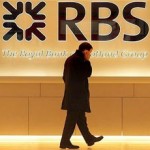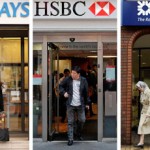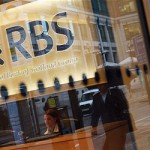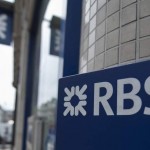RBS Stake Sale by U.K. Government to Begin in Coming Months
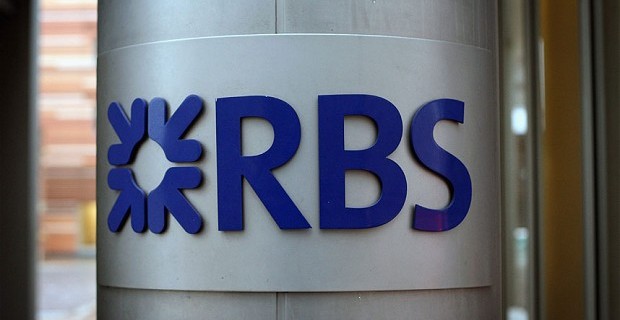
Chancellor of the Exchequer George Osborne said he’ll start returning Royal Bank of Scotland Group Plc to private ownership in the “coming months,” even though it may cause a loss for U.K. taxpayers.
Shares will be sold to institutional investors first, the chancellor announced in a speech at the annual Mansion House dinner in London’s financial district Wednesday. Disposing of RBS in its entirety “will take some years,” he said, though there’s “no reason” why a retail offering can’t be held at a later date. The Treasury published a report by Rothschild that advised the government to begin selling the shares to gain maximum value.
Osborne’s strengthened hand as chancellor in a majority Conservative government following last month’s election allows him to commit to selling the U.K.’s 79 percent stake in RBS earlier than anticipated. While the government will be selling some RBS shares at a loss, it has been able to recoup money by disposing of parts of its stake in Lloyds Banking Group Plc. The decision to proceed with the RBS sale was supported by Bank of England Governor Mark Carney.
“It’s the right thing to do for British businesses and British taxpayers,” Osborne said, according to remarks published by the Treasury. “Yes, we may get a lower price than Labour paid for it,” he said, referring to the 45 billion-pound ($70 billion) bailout of RBS by Gordon Brown’s government in 2008 and 2009. “But the longer we wait, the higher the price the whole economy will pay.”
Rothschild Report
The Rothschild report showed that if the government sold all its remaining shares in the banks it helped bail out — including Lloyds and RBS — at share prices on June 5, taxpayers would recoup 14 billion pounds more than the bailouts cost. That includes fees and other proceeds paid by the banks.
Selling all of the taxpayer’s stake in RBS at the current share price would lose about 7 billion pounds. However, a sale now would pave the way for later disposals at higher prices, offsetting the potential loss.
RBS welcomed Osborne’s announcement. “We are pushing ahead with our strategy to build a simpler, stronger, fairer bank that is totally focused on the needs of its customers and centered here in the U.K.,” Chief Executive Officer Ross McEwan said in a statement “When the government starts selling its shareholding, it will be selling a bank determined to be the best in the country.”
No Delay
Rothschild advised the Treasury not to wait for RBS to settle claims of misconduct in its handling of U.S. mortgage securities, because the bank’s share price already reflects the impact any settlement may have.
Any fine “is likely to be substantial,” McEwan said on a call with analysts in discussing the bank’s first-quarter earnings on April 30. A deal could come this year, but “may spill into 2016,” he said.
RBS could pay as much as $4.5 billion to resolve the claims brought in a lawsuit by the U.S. Federal Housing Finance Agency, Elliott Stein, an analyst for Bloomberg Intelligence, wrote May 27.
“It is not clear that there is much value to the government in waiting until the outcome of the case is known,” Rothschild wrote in its analysis presented to the Treasury. “We do not therefore see any reason why the government should not start to sell its RBS shares as a result of litigation risk.”
Breakeven Price
RBS rose 0.6 percent to 354.8 pence Wednesday in London. That compares with 357 pence on June 5 and the 407 pence at which the government has said it would break even on its bailout. The stock is down 10 percent this year, while Lloyds has advanced 14 percent.
“Now is the time for RBS to rebuild itself as a commercial bank no longer reliant on the state, but serving the working people of Britain,” Osborne said. “Given the size of our stake in RBS, the sales will take some years and will likely involve all types of investors.”
The government reduced its stake in Lloyds Wednesday to 17.9 percent, selling another 1 percent of shares. It also announced it would sell half of its 30 percent stake in Royal Mail Plc.
Unlike Lloyds, which resumed dividend payouts, RBS still isn’t returning capital to shareholders seven years after it was bailed out. McEwan has said the bank will return all capital to shareholders when the bank is above a 13 percent common equity Tier 1 ratio, a measure of financial strength.
Osborne is “letting RBS move on to its brighter future,” said Sandy Chen, an analyst at Cenkos Securities Plc with a buy rating on shares. “Now that the government has shifted to sell-down mode, it should be easier for RBS to resume regular dividend payments.”
Source: Bloomberg – RBS Stake Sale by U.K. Government to Begin in Coming Months









